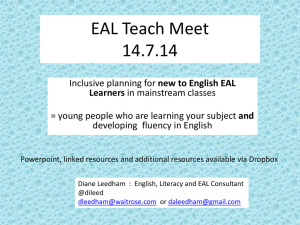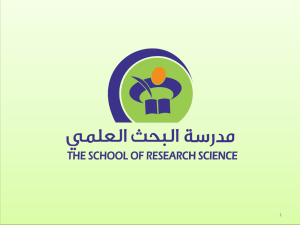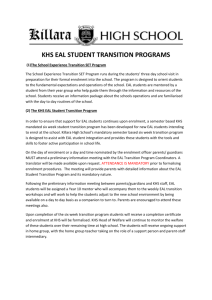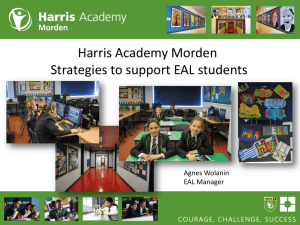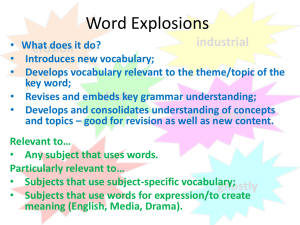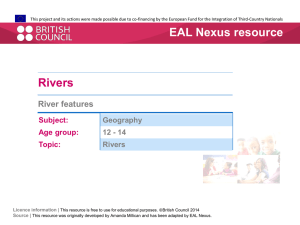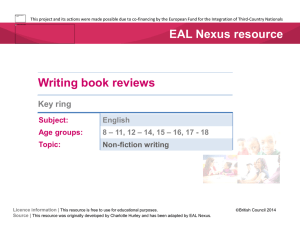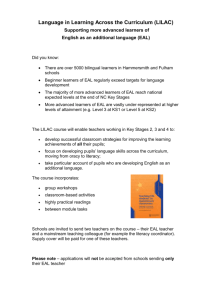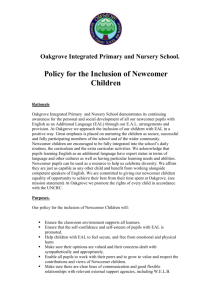English as an Additional Language or Dialect
advertisement
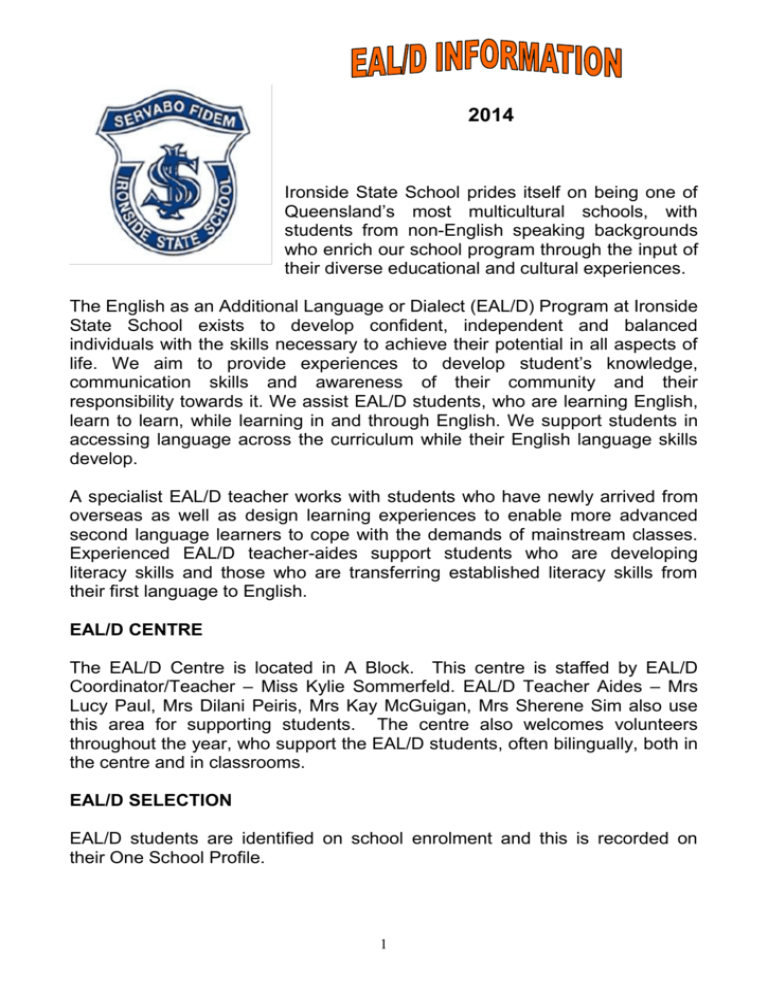
2014 Ironside State School prides itself on being one of Queensland’s most multicultural schools, with students from non-English speaking backgrounds who enrich our school program through the input of their diverse educational and cultural experiences. The English as an Additional Language or Dialect (EAL/D) Program at Ironside State School exists to develop confident, independent and balanced individuals with the skills necessary to achieve their potential in all aspects of life. We aim to provide experiences to develop student’s knowledge, communication skills and awareness of their community and their responsibility towards it. We assist EAL/D students, who are learning English, learn to learn, while learning in and through English. We support students in accessing language across the curriculum while their English language skills develop. A specialist EAL/D teacher works with students who have newly arrived from overseas as well as design learning experiences to enable more advanced second language learners to cope with the demands of mainstream classes. Experienced EAL/D teacher-aides support students who are developing literacy skills and those who are transferring established literacy skills from their first language to English. EAL/D CENTRE The EAL/D Centre is located in A Block. This centre is staffed by EAL/D Coordinator/Teacher – Miss Kylie Sommerfeld. EAL/D Teacher Aides – Mrs Lucy Paul, Mrs Dilani Peiris, Mrs Kay McGuigan, Mrs Sherene Sim also use this area for supporting students. The centre also welcomes volunteers throughout the year, who support the EAL/D students, often bilingually, both in the centre and in classrooms. EAL/D SELECTION EAL/D students are identified on school enrolment and this is recorded on their One School Profile. 1 EAL/D students may include: students who have recently arrived in Australia with a home language other than English; students who have been born in Australia but speak another language or dialect at home; students who have been born in Australia but have been educated in another language or country; students of a refugee background; and students who speak English at home but whose parents are using English as a second language occasionally also receive support through the program. Should parents be at all concerned about a student’s English proficiency in oral language or literacy, they should liaise with the classroom teacher initially. When appropriate, the EAL/D teacher will then assess the student’s proficiency in English and recommend the appropriate support. EAL/D students receive support mainly during their first 3 years from arrival, although some students continue to receive support if assessed as requiring this. Generally this is from Semester 2 in Prep to the end of Semester 1 in Year 3. They are monitored during this time, with support changing as their English language proficiency develops. This support may range from English Intensive Class (Monday to Thursday), small group or individual support, classroom support or term by term monitoring with incidental support on a needs basis. ENGLISH INTENSIVE CLASS An English Intensive Class will be operating during 2014. The EAL/D teacher, Miss Kylie Sommerfeld, will be teaching the classes in the EAL/D Centre in A Block. The classes will be offered to identified students from Monday to Thursday each week. They are timed to coincide with the regular classroom English curriculum. Students in Years 1 to 3 will attend between 9am and 10:45am. Students in Years 4 – 7 will attend between 11:30am and 1pm. These classes are for EAL/D students who are new to English. They will run on a 5 week program. Students will be assessed at the beginning and end of each program. Once English proficiency and oral confidence has been developed, the students will return to the regular classroom English curriculum. EAL/D teacher aide support will be maintained to further assist students in this transition. Students participating in the English Intensive Class will continue to engage in their classroom’s regular curriculum whilst not in the centre. EAL/D CURRICULUM Our EAL/D Program is designed to support mainstream education and to develop each student’s English language skills by providing focussed support. These sessions of support may occur within the classroom environment, or 2 through small group or individual withdrawal. Through these sessions the EAL/D teacher and teacher aides aim to: support the Essential Learnings of the curriculum; promote oral language and phonemic awareness; improve writing and spelling skills; focus on developing literacy skills; focus on enhancing reading and comprehension skills; promote computer literacy and develop reading and writing skills through interactive software; provide focussed support in the completion of specific class tasks, eg preparing for an oral presentation; provide support in preparing students sitting NAPLAN (Years 3, 5 & 7). INTERNATIONAL FAMILY NETWORK To ensure overseas parents, as well as students are included in the school community, the school hosts meetings of international parents who offer first language support to parents of newly enrolled EAL/D students and assistance in helping them settle their children into school. Overseas parents organise teas for their language groups to help parents to feel comfortable about visiting the school and to facilitate informal discussions about school and school programs. They also contact parents to involve them in school events such as school fetes and the annual International Breakfast. In this way the school establishes worthwhile partnerships between the people responsible for each child’s education. Information about the dates and times for these meetings appears in the school newsletter (sometimes in other languages) and other information for overseas parents appears on the school website. During 2014, there will be parent sessions offered to our overseas parents. These sessions will range from strategies to assist students at home with homework and language development, understanding Australian schooling systems and curriculum, behaviour management, as well as getting to know Brisbane. ADVICE FOR PARENTS WHO WANT TO KNOW HOW THEY CAN HELP THEIR CHILDREN WITH ENGLISH Children, who know their first language well, seem to find it easier to learn English. So parents can help them to learn English by continuing the development of their first language. We suggest you tell your children stories, discuss the news, TV documentaries and family commitments. Assist them in letter writing to grandparents or let them talk on the telephone to relatives overseas. 3 Parents can help prepare their children for their school experiences by taking them to the Queensland museum, to the beach, to the botanical gardens, for a ferry ride on the river, to their local library and to the zoo. Discuss these experiences with them in your own language. New concepts are best learned in the child’s first language so parents can help their children by teaching them to count, add and subtract, about time, colour, shape, texture, length and volume in their own language. Drawing a child’s attention to the sounds and rhythm in their own language enhances their listening ability and acquisition of English. It is beneficial to regularly liaise with your child’s classroom teacher. Good partnerships between home and school have been found to be instrumental in a child’s educational experience. Interpreters are able to be accessed as required. A great strategy is to discuss upcoming classroom topics with your child in your own language. This helps your child to understand these topics more easily when they being taught in their classroom. If you would like to contact us or make an appointment, please either call into the EAL/D Centre before or after school, or contact the EAL/D teacher, Kylie Sommerfeld via email – ksomm2@eq.edu.au. We hope you and your children enjoy being with us at Ironside. Kylie Sommerfeld M Ed (TESOL), BA (MAS), Grad Dip T (Primary), Grad Dip Computer Education. EAL/D Coordinator/Teacher Ironside State School 4
